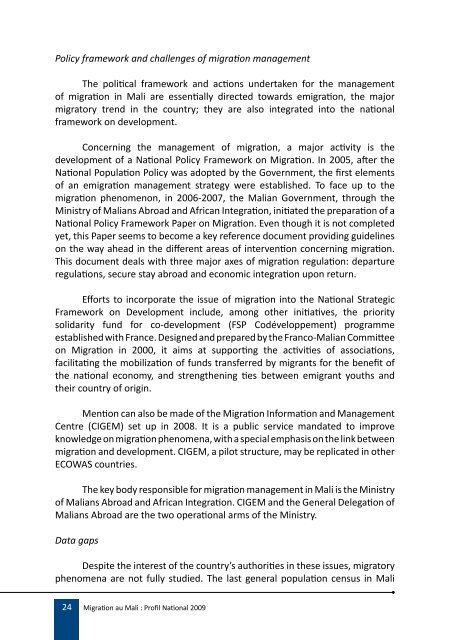Migration au Mali : Profil National 2009 - IOM Publications
Migration au Mali : Profil National 2009 - IOM Publications
Migration au Mali : Profil National 2009 - IOM Publications
Create successful ePaper yourself
Turn your PDF publications into a flip-book with our unique Google optimized e-Paper software.
Policy framework and challenges of migration management<br />
The political framework and actions undertaken for the management<br />
of migration in <strong>Mali</strong> are essentially directed towards emigration, the major<br />
migratory trend in the country; they are also integrated into the national<br />
framework on development.<br />
Concerning the management of migration, a major activity is the<br />
development of a <strong>National</strong> Policy Framework on <strong>Migration</strong>. In 2005, after the<br />
<strong>National</strong> Population Policy was adopted by the Government, the first elements<br />
of an emigration management strategy were established. To face up to the<br />
migration phenomenon, in 2006-2007, the <strong>Mali</strong>an Government, through the<br />
Ministry of <strong>Mali</strong>ans Abroad and African Integration, initiated the preparation of a<br />
<strong>National</strong> Policy Framework Paper on <strong>Migration</strong>. Even though it is not completed<br />
yet, this Paper seems to become a key reference document providing guidelines<br />
on the way ahead in the different areas of intervention concerning migration.<br />
This document deals with three major axes of migration regulation: departure<br />
regulations, secure stay abroad and economic integration upon return.<br />
Efforts to incorporate the issue of migration into the <strong>National</strong> Strategic<br />
Framework on Development include, among other initiatives, the priority<br />
solidarity fund for co-development (FSP Codéveloppement) programme<br />
established with France. Designed and prepared by the Franco-<strong>Mali</strong>an Committee<br />
on <strong>Migration</strong> in 2000, it aims at supporting the activities of associations,<br />
facilitating the mobilization of funds transferred by migrants for the benefit of<br />
the national economy, and strengthening ties between emigrant youths and<br />
their country of origin.<br />
Mention can also be made of the <strong>Migration</strong> Information and Management<br />
Centre (CIGEM) set up in 2008. It is a public service mandated to improve<br />
knowledge on migration phenomena, with a special emphasis on the link between<br />
migration and development. CIGEM, a pilot structure, may be replicated in other<br />
ECOWAS countries.<br />
The key body responsible for migration management in <strong>Mali</strong> is the Ministry<br />
of <strong>Mali</strong>ans Abroad and African Integration. CIGEM and the General Delegation of<br />
<strong>Mali</strong>ans Abroad are the two operational arms of the Ministry.<br />
Data gaps<br />
Despite the interest of the country’s <strong>au</strong>thorities in these issues, migratory<br />
phenomena are not fully studied. The last general population census in <strong>Mali</strong><br />
24 <strong>Migration</strong> <strong>au</strong> <strong>Mali</strong> : <strong>Profil</strong> <strong>National</strong> <strong>2009</strong>
















